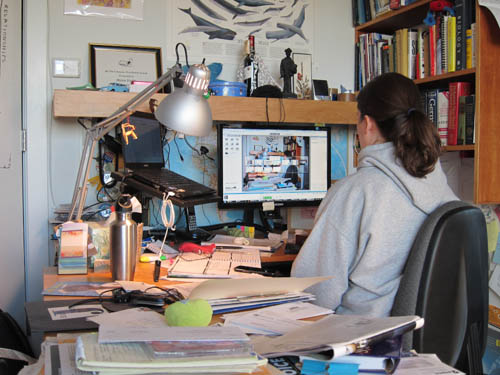I wrote this post two years ago, when I worked full-time at home and my desk was super messy. Right now I am sitting at that same desk and there are four pieces of paper on it, three of which are the pages of one bill. Reasons for the change include:
- Marie Kondo changed my life. Maybe if you’re lucky I’ll write about it someday.
- I have a job in an office now, and most of my papers live in that office. (And they’re mostly in file cabinets!)
- I did my taxes on Sunday, but first I cleaned my desk really thoroughly, because procrastination is kind of my thing.
My desk is a disaster. Let’s see…there’s a pile of notebooks. An extension cord. A Christmas card from Switzerland and a postcard from Oklahoma. Index cards with poems by Wordsworth and Blake. A folder with the notes for a paper I wrote in 11th grade. And the only reason there’s no stack of unread and partially-read New Yorkers is that the stack has temporarily relocated to the dining room table.
I don’t understand people with clean desks. Do they drop everything to pay a bill the instant it arrives? Do they heartlessly throw away postcards, mere months after receipt? I bet they think to put tools straight into the tool box, rather than putting them on a stack of papers for a couple of weeks first. They’re probably even capable of recycling conference handouts that have a 90% chance of being useless. (My threshold is more like 99.8%.)
And what does it mean for my work, being surrounded by these piles of things?
Some researchers at the University of Minnesota’s business school thought this question, of the messy or neat environment, was worth looking at. They tried out some hypotheses on what neat and messy desks do for your thinking. The study was published in the journal Psychological Science last fall.
In each experiment, students—the guinea pigs of psychological science—were randomly assigned to do the study in a messy room or an orderly room.
In one experiment, each student filled out questionnaires that had nothing to do with the study for 10 minutes. Then they were given the chance to donate to a charity by writing the amount they’d give on a piece of paper and sealing it in an envelope. Finally, they were offered a snack: either an apple or a chocolate bar.
People who’d been in the neat environment behaved better. They did what they were supposed to. They offered more money and they were more likely to pick the healthy snack than the people who’d sat at the messy desk. More than half of the people who’d been at the messy desk didn’t offer to donate anything at all—compared to only 18 percent of the clear-desk people.
Look on thy selfish, chocolate-eating ways, messy brethren, and despair.
But it turns out my cluttered tribe is good for something. In another experiment, participants were told to come up with new ways to use ping-pong balls. Their answers were rated by creativity. My dear fellow members of Team Disorderly, we are creative as heck. At least, we’re more creative than people who sit at neat desks. Those people were like, “Uh, hit them with badminton rackets?” and we were all, “Cut them in half to make tiny hors d’oeuvres bowls! Throw them to get a professor’s attention! Paint them like planets!”
When I have a thing, I put it on a horizontal surface. That is the way it’s always been. This creates a sort of three-dimensional to-do list, which has a way of turning into a three-dimensional things-I’ll-never-do list. This creates a lot of guilt.
But this study makes me feel a little better about myself. I may be way overdue on filling out the American Community Survey, but I bet I’ll come up with a great metaphor in my next story.
photo: Helen Fields

My desk is also a disaster AND I’m not a bad person